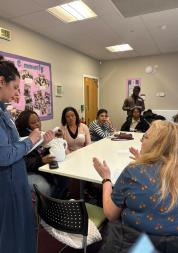Report: Maternity care at Queen Elizabeth

Overview
Following feedback gathered from case studies, conversations with service users, concerns raised by community groups, and discussions with stakeholders, Healthwatch Greenwich conducted a qualitative study on the experience of maternity care in Greenwich amongst English-speaking women of colour from a migrant or refugee background. This included community pre and postnatal services such as community midwives, health visitors and baby clinics, as well as hospital-based antinatal, delivery, and postnatal care at Queen Elizabeth Hospital (QEH).
We carried out in depth interviews with seven women who all had experience of giving birth in Greenwich in the last two years.
Aim
To explore the differences in maternity services amongst English speaking women of colour from a migrant or refugee background
Methodology
Our aim is to gather people’s experiences of services using interviews, focus groups or small surveys, rather than conducting large scale quantitative research. In comparison to quantitative research, we focus on words rather than numbers, and depth rather than breadth. Our method is exploratory; we seek to unearth experiences, opinions, thoughts, and feelings.
Acknowledgements
We would like to thank the women who participated in this study for sharing their experiences and views with us. We would also like to thank the Lewisham Refugee and Migrant Network (LRMN) for facilitating meetings with their service users and for providing their insight throughout this project.
Findings
In contrast to much of the literature on migrant and refugee women of colour’s poor experience of maternity care (Higginbottom et al., 2019; Jones et al., 2022), it seemed clear during the initial stage of analysis that the women we spoke with had experienced fewer challenges and barriers to accessing maternity care. As a result of our analysis, we identified two key reasons for this: women’s level of proficiency in English and their previous experience of giving birth.
All participating women either spoke English as a first language or to an intermediate level. Only one of the seven women used an interpreter during her maternity care, and largely to translate specific complex maternity related terms. All participating women had previous experience of giving birth, most in the UK.
However, key differences did emerge between community-based maternity services, particularly the community midwifery team, and hospital based maternity care at Queen Elizabeth Hospital. We categorised our findings into these two groups, through which several sub-themes emerged.

